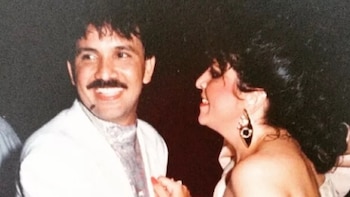
Verses such as “A big cloud rises in the sky; a heavy storm is approaching. Here comes the woman I love most; for whom I despair and even lose my mind”, they have gone through several generations with the same validity as that of that 1976, when 'La creciente', one of the most remembered songs by Rafael Orozco Maestre, who was born on March 24, but 1954, was released.
The accordion verses took hold of Orozco from a very young age, when he was just a student, and it was such a passion for music that he decided, together with accordion player Israel Romero, to found what is now 'La universidad del vallenato', the Gold Binomial of America. That group that started with only two people, ended up being a benchmark in the vein of the genre, as it pioneered instruments such as bass to their songs, something that at that time, was a taboo in today's 'vallenato yuca'.
Those lyrics, which were poems with a box and a chord, were the main element that differentiated Rafael Orozco from other Colombian singers, and that exponential growth that the Golden Binomial had was a double-edged sword, because in those 70s (the time of boom for the vallenato) a young man who came from La Junta was 'asking for clue' and by the name of Diomedes. He was not the nicest, but he was one of the most charismatic, and that was why several followers of both artists and from some sides of the regional press created a 'rivalry' between the two.
That competition was not at the level of Emiliano Zuleta Baquero and Lorenzo Morales; in fact, according to stories such as the chronicle 'The Testament of the Old Mile' by Salcedo Ramos, it was created precisely by huddles created around friends and followers of accordion players. Neither Díaz nor Orozco confirmed the alleged rivalry, but not a few music journalists were more inclined to the one born in the Caesar municipality of Becerril.
It may interest you: Bogotá will celebrate World Theater Day with 40 plays in 11 locations: check out the full program
Their clothing, unique to many and extravagant for others, marked a milestone in the group that was characterized, among other things, by their shiny trousers and sequined jackets, imposing a style from the start of the stage. But with all this growing success, various problems burdened the life of the poet vallenatero.
That night of Thursday, June 11, 1992, the country mourned the death of Orozco Maestre, and about this fact several theories were generated; some even related the singer to Pablo Escobar, but this was nothing more than a rumor. According to the official version, delivered by the Police, the murder in Barranquilla was caused by a 'mess of skirts'
According to several investigations carried out, the authorities determined that the crime occurred because of a possible 'love triangle' involving the singer and María Angelica Navarro, who was then very close friends with José Reynaldo Fiallo Jácome, a drug trafficker who, some time later, was murdered by orders from Pablo Escobar.
With regard to the person who shot Rafael Orozco that night, he is presumed to have been the bodyguard of 'El Nano Fiallo'; what is true is that after carrying out the forensic tasks, it was found that at least two of the projectiles extracted from the body of the singer-songwriter were from a Heckler & Koch pistol, which was carrying the escort of the narco with a safe conduct of the Second Brigade of the Army.
Almost 30 years after Orozco's death, the real cause of that event that broke the history of the Golden Binomial in two remains unknown and generated, among fans of the genre, questions such as “What would become of this music if Rafael Orozco had not died?” The truth is that, 68 years after his birth, verses from songs such as 'Reliquary of Kisses', 'On his knees', 'Die a flower', 'Confession' and 'The cry of a king', whose lyrics are full of nostalgia and lyricism.
“If you sang my songs to the breeze; and enrich this kingdom with a smile; you could no longer forget that happy October; when you arrived, I was waiting a thousand years for you”, is heard in that creation of José Alfonso 'Chiche' Maestre launched in 1991.
KEEP READING
Últimas Noticias
Debanhi Escobar: they secured the motel where she was found lifeless in a cistern
Members of the Specialized Prosecutor's Office in Nuevo León secured the Nueva Castilla Motel as part of the investigations into the case

The oldest person in the world died at the age of 119
Kane Tanaka lived in Japan. She was born six months earlier than George Orwell, the same year that the Wright brothers first flew, and Marie Curie became the first woman to win a Nobel Prize

Macabre find in CDMX: they left a body bagged and tied in a taxi
The body was left in the back seats of the car. It was covered with black bags and tied with industrial tape
The eagles of America will face Manchester City in a duel of legends. Here are the details
The top Mexican football champion will play a match with Pep Guardiola's squad in the Lone Star Cup

Why is it good to bring dogs out to know the world when they are puppies
A so-called protection against the spread of diseases threatens the integral development of dogs




